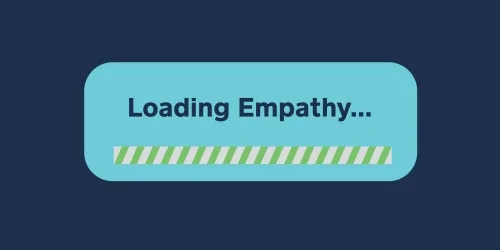Meaningful communication doesn't always just happen. It takes skill.

Listening with empathy will help you thrive as a mindful communicator.
Practicing empathetic listening benefits you both personally and professionally.
It helps you understand cues from someone's voice, feelings, and body language. Plus, it builds trust and sets you up to respond as best you can, no matter the conversation.
Empathy Is Not Sympathy

Empathy and sympathy, while closely related, aren't the same.
Sympathy means expressing how sorry you feel when someone else is experiencing unfortunate events.
Empathy means being sensitive and aware of others' emotions, experiences, and thoughts. Simply put, empathy implies that you're experiencing others' feelings.
Being an empathetic listener goes beyond saying: "I understand that," or " Everything is gonna be OK." It's about your willingness and awareness to put yourself in others' shoes.
Check out the video below to see the differences between an empathetic listener and a sympathetic listener:
Did you know?
How To Be An Empathetic Listener
Be fully present.
Pay full attention to the conversation you're in. Don't look at your phone. Focus on the speaker.
Be patient.
Often, people need time to feel comfortable when talking about something embarrassing or painful. Give the speaker the moment they need. Don't rush talking. Sometimes, silence is also a natural and appropriate response.
Let the speaker take the lead.
It's great to encourage the speaker to talk more by introducing your own experience, but be aware of turning this conversation into your own narrative. Let the other person decide what they want to share — then make sure you're all ears.
Show engagement.
Leaning, nodding, and rephrasing what the speaker says shows that you are listening.
Read non-verbal cues.
Body language, facial expressions, and gestures can send powerful cues about the feelings of communicators. These non-verbal clues will give you much more information about the speaker's true feelings.
Hold your judgment.
You may or may not agree with the perspective of others. No matter what your standpoint is, "no judgment, just help" is the basic rule to be an empathetic listener.
Quiz
Your friend is really upset that their long-term relationship just ended. Which of the following responses show that you're listening with empathy?
Additional Guidance
 Photo by Clay Banks on Unsplash
Photo by Clay Banks on UnsplashMaintain confidentiality.
You often hear "confidentiality" when people talk about business agreements, but it's important with family and friends, too. Keep private conversations private. Confidentiality builds trusting and lasting relationships.
Stay composed.
When listening to a person's story makes you emotional, try to keep calm. If you have a strong reaction, you might fuel the speaker's emotions, or make them feel like they need to take care of you.
Practice daily.
Empathetic listening is a skill you can learn, develop, and improve through practice. Make empathetic listening a habit! It's a trait of respect, humanity, and care.
Quiz
Your friend Tom told you about his experience of being bullied. You though it would be a great example to help teach your little brother about respect. What would you do?
Subscribe for more quick bites of learning delivered to your inbox.
Unsubscribe anytime. No spam. 🙂
Take Action
 Photo by Aarón Blanco Tejedor on Unsplash
Photo by Aarón Blanco Tejedor on UnsplashEmpathetic listening is a social skill that helps build stronger connections and competency to regulate your own emotions.
Your feedback matters to us.
This Byte helped me better understand the topic.
